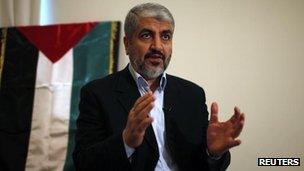Profile: Khaled Meshaal of Hamas
- Published

Khaled Meshaal survived an Israeli assassination attempt in 1997
Khaled Meshaal has been a key figure at the top of the leadership of the Palestinian militant group Hamas for many years, although his role and influence have been both shifting and imprecise.
Born in the West Bank village of Silwad in 1956, Mr Meshaal moved to Kuwait after the 1967 Middle East war, then later Jordan, where his involvement with Hamas began.
He left Kuwait for Jordan after Iraq invaded the emirate in 1990.
Mr Meshaal became Hamas's political leader in exile in 2004, when its founder Sheikh Ahmed Yassin was assassinated by Israel. Unaffected by Israeli travel restrictions, he has been able to represent Hamas at meetings with foreign governments and other parties throughout the world.
Over the past year though tensions over strategy between Hamas's leaders in exile and those in Gaza - the group's stronghold - have emerged, and Mr Meshaal has indicated he will not stand for re-election.
His first ever visit to Gaza this week- ostensibly to mark Hamas's 25th anniversary - will be closely watched for signs on the future direction of the group's leadership.
The trip follows November's eight-day conflict with Israel that left some 170 Palestinians - mostly civilians - and six Israelis dead. Mr Meshaal called the conflict a victory over the Jewish state.
Unity talks
Two of the key issues facing Hamas are whether to adopt a more pragmatic approach towards Israel - Hamas's charter calls for Israel's destruction - and attempts at reconciliation with Fatah.
An eight-day conflict with Israel in November left some 170 Palestinians and six Israelis dead
In 2011, Mr Meshaal and Palestinian Authority President Mahmoud Abbas - the Fatah leader - endorsed an Egyptian plan to reconcile the rival factions.
Although attempts to forge a Palestinian government of national unity have since stalled, some observers believe Mr Meshaal could emerge as a candidate to head such an administration.
Mr Meshaal this year strongly supported Mr Abbas's move in upgrading Palestinian status at the United Nations to that of a non-member "observer state".
He has said a long-term truce with Israel might be possible if Israel accepted conditions, including a withdrawal to 1949 ceasefire lines, but has rejected peace talks.
Poisoned
Hamas is officially regarded as a terrorist organisation by Israel, the EU and US.
Its political leaders in exile, Mr Meshaal included, have therefore had a transitory life.
He was in Jordan in 1997, in charge of international fundraising at the Hamas bureau in Amman, when Israeli agents tried to assassinate him with poison. King Hussein demanded an antidote to the poison from Israel.
Jordan closed the bureau in the late 1990s and briefly jailed Mr Meshaal before expelling him to Qatar.
Mr Meshaal then headed to Syria, where he became political leader in exile.
Syria welcomed the group, providing its leaders with a safe haven, and helping to supply it with weapons and money for the armed struggle against Israel, with which Syria is still technically at war.
But in February 2012, Mr Meshaal and the rest of the political leadership in exile moved from Syria to Egypt and Qatar.
The move followed a declaration of support for the Syrian people in their uprising against President Bashar al-Assad by the head of the Hamas government in Gaza, Ismail Haniya.
Analysts said the Sunni Islamist Hamas was torn between risking the support of its main financial backers - Syria and its ally, Iran - and supporting Syria's majority Sunni community, which has borne the brunt of the crackdown by the Alawite-dominated security forces.